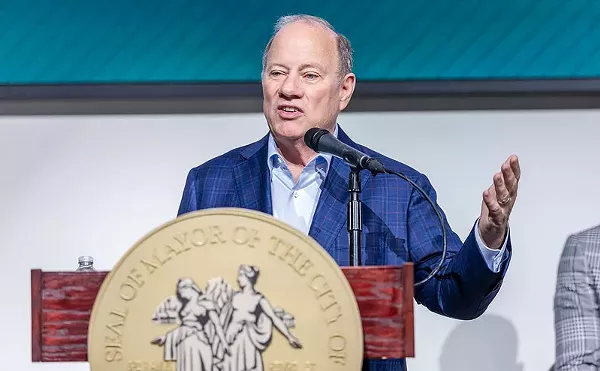
Audio By Carbonatix
[
{
"name": "GPT - Leaderboard - Inline - Content",
"component": "35519556",
"insertPoint": "5th",
"startingPoint": "3",
"requiredCountToDisplay": "3",
"maxInsertions": 100,
"adList": [
{
"adPreset": "LeaderboardInline"
}
]
}
]
Here's a sentence you won't see often in News Hits: Kudos to the Detroit International Bridge Co.
Yeah, that's right. Manuel "Matty" Moroun's much-vilified company, which owns the Ambassador Bridge, has done something praiseworthy.
In what was billed as a David vs. Goliath battle between the billionaire bridge company owner and the owners of a small bait shop in southwest Detroit, David won without much fuss.
In early February, lawyers for Lafayette Bait and Tackle Shop filed suit against the bridge company in federal court. They claimed that their shop, which had been in existence for nearly 60 years, was ruined when the company closed off a section of 23rd Street. That closure, which the city has argued was done illegally as part of the bridge company's sprawling truck plaza and duty free shop adjacent to the bridge, prevented access to the bait shop.
Business dried up and the family, which lived on the property, was forced to endure what one of their attorneys, Bill Goodman, described as the "horrific" conditions.
Goodman, speaking at a press conference held Tuesday morning at his firm's Detroit office, said the expectation was that the bridge company would fight the lawsuit with "every fiber of its being."
That's what the company usually does.
But not in this case. Instead, to the "great surprise and pleasure" of Goodman and his co-counsel, John Philo of the nonprofit Sugar Law Center, the company quickly settled — even though, according to bridge company attorney William Seikaly, the DIBC had done nothing wrong.
Seikaly indicated that the real culprit, or at least one of them, is an outfit known as Commodities Export Ltd. That company owned the property the bait shop sat on.
According to Goodman, bait shop owners Dean and Rita Aytes were used as pawns for years as Commodities Export held off selling the property to the bridge company, which needed the land to have complete control of the area where the truck plaza is located.
In December, the bridge company bought the land. According to Seikaly, part of the deal was that Commodities Exchange agreed to assume legal liability if any lawsuits associated with the property were brought following the sale.
Terms of the settlement were not disclosed.
It may well be, though, that this isn't the end of legal action. Goodman indicated that he and his clients may decide to bring a lawsuit against Commodities Export. And bridge company lawyer Seikaly said it, too, could file suit against the former owners of the property.
We'd say there's an extremely high probability that the bridge company will bring such a suit. As we said, part of the land purchase deal included a clause stating that Commodities Exchange would "indemnify" the bridge company if a suit were brought against it. In laymen's terms, that means that Commodities Exchange would be the responsible party.
So it is now likely that the bridge company will go after Commodities Exchange in an attempt to recoup the cash it agreed to pay the Aytes family.
Commodities Exchange attorney Kenneth C. Harrison denied that his client had used the family and their business as pawns.
"They're setting us up as fall guys in a backroom deal," Harrison said.
Basically, he explained, the bridge company is trying to milk the situation, gaining much-needed good publicity while expecting Commodities Exchange to eventually foot the bill.
The process of demolishing the bait shop has begun. But the court battles surrounding it, like many of the legal issues surrounding the bridge company and its attempts to build a second span, appear to be far from over.





